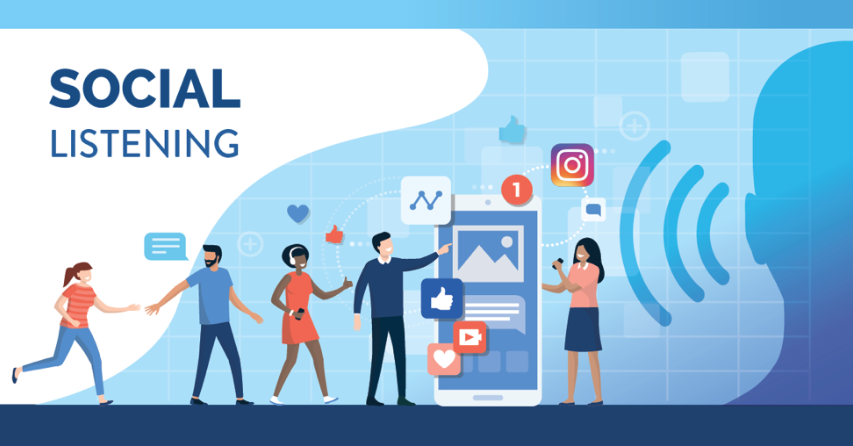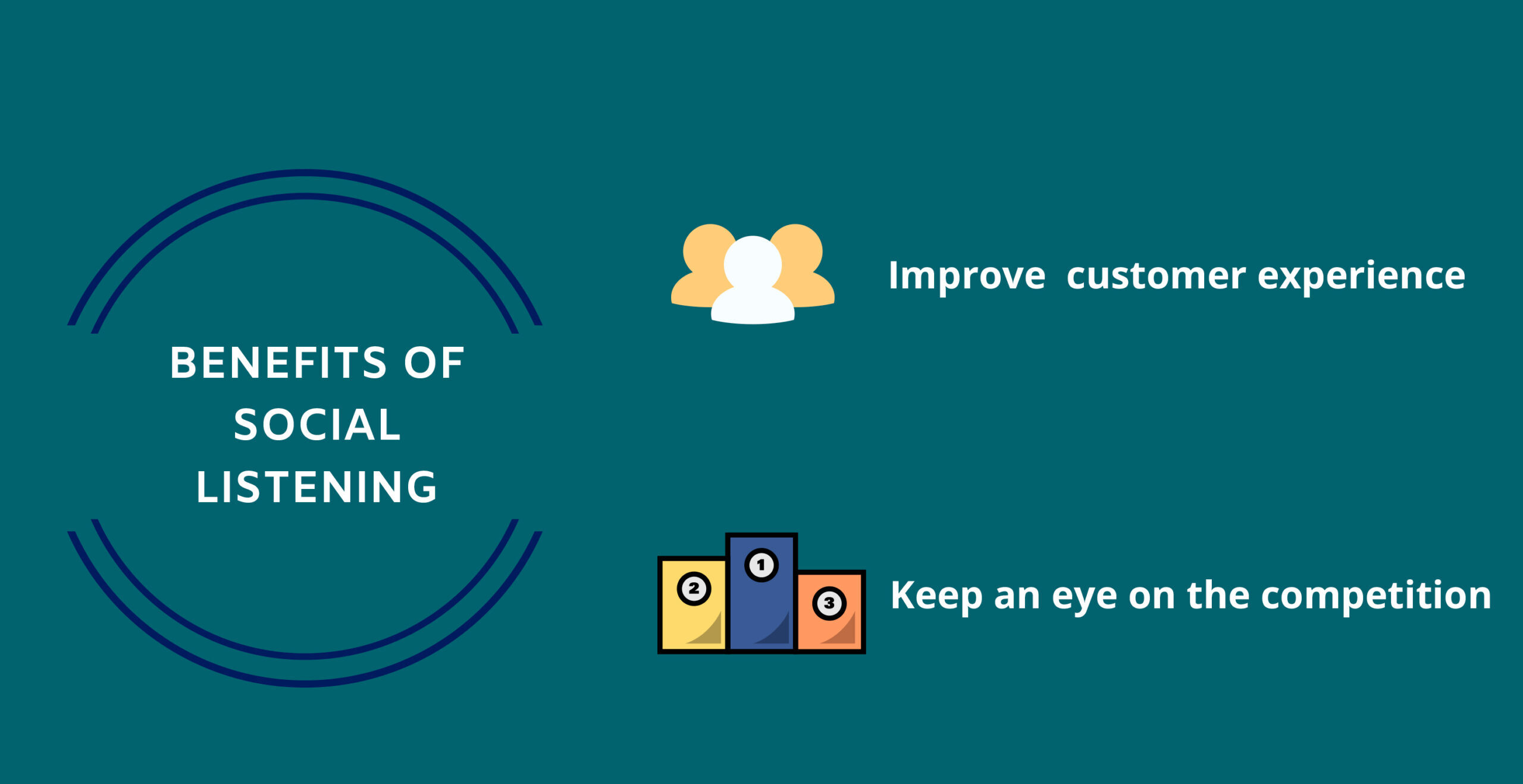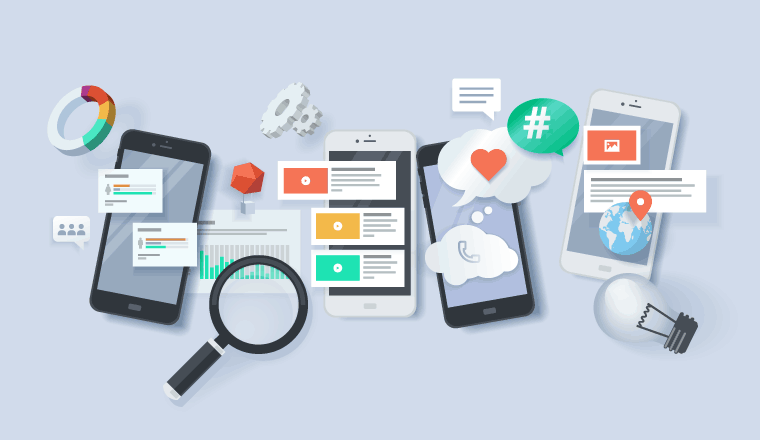In today’s digital age, social media has become an integral part of our lives. With millions of conversations happening online every day, businesses have an incredible opportunity to gain valuable insights and improve their brand reputation through social listening. In this article, we will explore the benefits of social listening and how it can revolutionize your business strategy.
What is Social Listening?

Definition
Social listening refers to the process of monitoring online conversations and analyzing them for insights. It involves tracking mentions, discussions, and sentiments related to your brand, industry, or specific keywords across various social media platforms.
Importance
Social listening is essential because it allows businesses to understand customer opinions, preferences, and concerns. By actively listening to their target audience, companies can adapt their strategies, improve customer satisfaction, and stay ahead of the competition.
Benefits of Social Listening

Customer Insights
One of the primary benefits of social listening is gaining valuable customer insights. By monitoring online conversations, businesses can identify trends, preferences, and pain points of their target audience. This information can be used to tailor products, services, and marketing campaigns to better meet customer needs.
Brand Reputation Management
Social listening provides businesses with an opportunity to manage their brand reputation effectively. By monitoring mentions and sentiments, companies can address customer concerns promptly, resolve issues, and maintain a positive brand image. It also enables proactive reputation management by identifying potential crises before they escalate.
Crisis Management
In times of crisis, social listening becomes even more crucial. By closely monitoring conversations during a crisis, businesses can gather real-time feedback, address customer concerns, and provide timely updates. Social listening helps in crisis management by enabling companies to respond quickly, mitigate damage, and rebuild trust.
Competitive Analysis
Social listening allows businesses to keep an eye on their competitors. By monitoring competitor mentions and analyzing their strategies, companies can gain valuable insights into their strengths, weaknesses, and market positioning. This information can help in identifying gaps in the market and developing a competitive edge.
Content Strategy Enhancement
Social listening can significantly enhance your content strategy. By understanding the topics and themes that resonate with your audience, businesses can create more relevant and engaging content. Social listening helps identify popular trends, pain points, and frequently asked questions, enabling companies to produce content that adds value and drives engagement.
How to Implement Social Listening
Define Your Goals
Before implementing social listening, it is crucial to define your goals. Determine what you want to achieve through social listening, such as improving customer satisfaction, enhancing brand reputation, or gaining market insights. Clear goals will guide your strategy and help you measure success.
Choose the Right Tools
There are various social listening tools available in the market. Choose a tool that suits your needs and budget. These tools can help you monitor mentions, analyze sentiment, track trends, and provide comprehensive reports. Examples of popular social listening tools include Brandwatch, AIM Insights, and Sprout Social.
Monitor Relevant Conversations
Identify the relevant channels and keywords you want to monitor. This can include social media platforms, forums, blogs, and review sites. Monitor conversations related to your brand, industry, competitors, and relevant topics. Pay attention to sentiment, keywords, and emerging trends.
Analyze and Act
Once you have gathered data through social listening, it’s crucial to analyze it and take action. Identify patterns, trends, and insights that can inform your business decisions. Use the information gathered to improve your products, enhance customer experiences, and optimize your marketing strategies.
Best Practices for Social Listening

Monitor Multiple Channels
To get a comprehensive understanding of your audience, monitor multiple channels. Keep an eye on social media platforms like Facebook, Twitter, Instagram, LinkedIn, and industry-specific forums or communities. Each platform offers unique insights and perspectives.
Engage with Your Audience
Social listening is not just about monitoring; it’s also about engaging with your audience. Respond to mentions, comments, and questions promptly. Show your customers that you are listening and value their feedback. Engaging with your audience builds trust and strengthens your brand reputation.
Collaborate with Other Teams
Social listening should not be limited to the marketing team alone. Involve other departments, such as customer service, product development, and sales, in the social listening process. Collaborating with different teams ensures a holistic approach and enables better decision-making based on collective insights.
Case Studies with Record-Breaking Results
Case Study 1: Nike’s Social Listening Success
Nike is known for its strong brand presence, but it also excels in social listening. During the 2018 FIFA World Cup, Nike closely monitored social media conversations around soccer, identifying a growing demand for personalized gear. By acting on these insights, Nike launched a limited-edition “Nike By You” customization campaign. This led to a 300% increase in engagement and record-breaking sales during the tournament.
Case Study 2: Netflix’s Customer-Centric Approach
Netflix uses social listening to understand viewer preferences and create content that resonates. A prime example is their hit show “Stranger Things.” By analyzing social conversations, Netflix noticed the high engagement around nostalgia-driven content. They leveraged this insight to shape the show’s marketing, resulting in over 15 million views within the first three days of its season 3 release.
Case Study 3: Wendy’s Viral Twitter Strategy
Wendy’s is a master of using social listening to engage audiences. By keeping an eye on Twitter conversations, Wendy’s adopted a witty, humorous approach to customer interactions. In 2017, a fan jokingly asked how many retweets were needed for a year of free chicken nuggets. Wendy’s quickly responded with “18 million”, sparking the viral #NuggsForCarter campaign. The tweet became one of the most retweeted in history, leading to increased brand awareness and a major boost in customer engagement.
Influencer Quotes
Gary Vaynerchuk (@garyvee)
“Social listening isn’t just about responding—it’s about understanding your audience better than they understand themselves.”
Neil Patel (@neilpatel)
“Brands that use social listening have a massive advantage. They can shape their strategies in real time based on actual customer insights.”
Rand Fishkin (@randfish)
“Ignoring social listening is like covering your ears while your customers are speaking. The brands that listen will always win.”
Kim Garst (@kimgarst)
“Engagement starts with listening. If you’re not listening, you’re missing opportunities to connect with your audience on a deeper level.”
By leveraging social listening like these brands and influencers, businesses can unlock game-changing insights that fuel growth, engagement, and customer satisfaction.
Conclusion
In conclusion, social listening offers numerous benefits for businesses of all sizes. By actively monitoring online conversations, companies can gain valuable customer insights, manage their brand reputation effectively, handle crises, perform competitive analysis, and enhance their content strategies. Implementing social listening requires clear goals, the right tools, and a proactive approach to analyzing and acting upon the gathered data. By incorporating best practices and engaging with their audience, businesses can unlock the full potential of social listening to stay ahead in today’s competitive landscape.
If you’re ready to take your social listening efforts to the next level, we invite you to request a demo from AIM Technologies. Our advanced social listening platform is designed to provide real-time insights and actionable intelligence to help you make informed business decisions. Don’t miss out on the opportunity to harness the power of social listening for your organization.
FAQs
What is the difference between social listening and social monitoring?
- Social listening involves analyzing online conversations for insights and trends, while social monitoring focuses on tracking brand mentions and engagements.
Can social listening help with identifying influencers?
- Yes, social listening can help identify influential individuals who have a significant impact on your target audience’s opinions and behaviors.
Is social listening only relevant to large businesses?
- No, social listening is beneficial for businesses of all sizes. It provides valuable insights for small businesses to understand their customers better and make informed decisions.
How often should I monitor social media conversations?
- The frequency of monitoring depends on your business goals and resources. Ideally, regular monitoring is recommended to stay updated on customer sentiment and industry trends.
Are there any free social listening tools available?
- Yes, some social listening tools offer free plans with limited features. Examples include Google Alerts, TweetDeck, and Social Mention.




